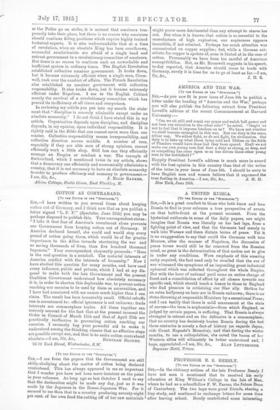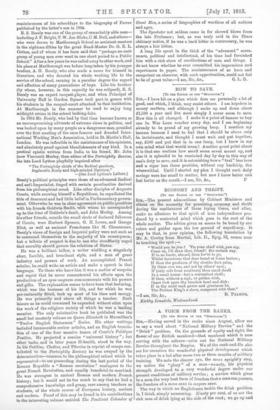PROFESSOR E. S. BEESLY.
[To TIM EDITOR OF THE " SPROTATOR."]
Sin,—In the obituary notices of the late Professor Beesly I have not seen it mentioned that he received his early education at King William's College in the Isle of Man, where he had as a schoolfellow F. W. Farrar, the future Dean of Canterbury. The two boys were great friends, sharing a tiny study, and continued to exchange letters for some time after leaving school. Beesly contributed some interesting reminiscences of his schooldays to the biography of Farrar published by the latter's son in 1904.
E. S. Beesly was one of the group of remarkably able men— including J. F. Bright, T. W. Jex-Blake, C. M. Bull, and others— who were drawn to Marlborough School as assistant-masters in the eighteen-fifties by the great Head-Master Dr. G. E. L. Cotton, and of whom it has been said that "perhaps no such group of young men ever went in one short period to a Public School." After a few years he was called away to other work, and his place at Marlborough was before long taken by his younger brother, A. H. Beesly, who also made a name for himself in literature, and who devoted his whole working life to the service of the school, earning in a peculiar degree the regard and affection of many generations of boys. Like his brother (by whom, however, in this capacity he was eclipsed), E. S. Beesly was an expert racquet-player, and when Principal of University Hall in Gordon Square took part in games with his students in the racquet-court attached to that institution. At Marlborough in the summer he used to enjoy long midnight swims in the school bathing-lake.
In 1864 Mr. Beesly, who had by that time become known as an uncompromising advocate of extreme views in politics, and was looked upon by many people as a dangerous man, presided over the first meeting of the once famous and dreaded Inter- national Working Men's Association, held in St. Martin's Hall, London. He was inflexible in the maintenance of his opinions, and absolutely proof against blandishments of any kind. In a poetical epistle written from India to his friend, Mr. John (now Viscount) Morley, then editor of the Fortnightly Review, the late Lord Lytton playfully inquired after "The Fortnightly chiefs of the Radical garrison, Implacable Beaty and high-minded Harrison." —(See Lord Lytton's Letters.) Beesly's political principles were those of an advanced Radical and anti-Imperialist, tinged with certain peculiarities derived from his philosophical creed. Like other disciples of Auguste Comte, while avowing himself a Republican, he repudiated the title of democrat and had little belief in Parliamentary govern- ment. Otherwise he was in close agreement on public questions with his friends Goldwin Smith, with whom he corresponded up to the time of Goldwin's death, and John Morley. Among his other friends, outside the small circle of declared followers of Comte, were Herbert Spencer, G. H. Lewes, and George Eliot, as well as eminent Frenchmen like M. Clemenceau. Beesly's views of foreign and Imperial policy were not such as to commend themselves to the majority of his countrymen; but a tribute of respect is due to one who steadfastly urged that morality should govern the relations of States.
He was a brilliant talker, a writer wielding a singularly clear, forcible, and trenchant style, and a man of great industry and powers of work. An accomplished French scholar, be could write an article and make a speech in that language. To those who knew him it was a matter of surprise and regret that he never concentrated his efforts upon the production of an opus magnum commensurate with his powers and gifts. The explanation seems to have been that lecturing, which was the business of his life, and for which he was pre-eminently fitted, took up most of his time and energy. He was primarily and above all things a teacher. Such leisure as he could command he expended without stint upon the work of the religious society of which he was a loading member. The only substantive book he published was the small but masterly volume on Queen Elizabeth in Macmillan's "Twelve English Statesmen" Series. His other writings included innumerable review articles, and an English transla- tion of one of the four massive tomes of Comte's Politique Positive. He projected a concise "universal history " ; but other tasks, and in later years ill-health, stood in the way, In his Catiline, Clodiue, and Tiberius (a reprint of essays con- tributed to the Fortnightly Review) he was swayed by the determination—common to the philosophical school which he represented—to see proceeding during the last period of the Roman Republic a " Roman revolution " analogous to the great French Revolution, and equally beneficial to mankind. He was strongest in ancient Roman and modern French history; but it would not be too much to say that be had a comprehensive knowledge and grasp, rare among teachers or students, of the whole course of European history, ancient and modern. Proof of this may be found in his contributions to the interesting volume entitled The Positivist Calendar of Great Men, a series of biographies of worthies of all nations and ages.
The Spectator not seldom came in for shrewd blows from the late Professor ; but, as was truly said in the Times obituary notice, if he was a hard hitter in controversy, he was always a fair hitter.
A long life spent in the thick of the "advanced" move. ments, political and intellectual, of his time had furnished him with a rich store of recollections of men and things. I do not know whether he ever committed his impressions and experiences to paper. The reminiscences of so keen and competent an observer, with such opportunities, could not fail to be of great value.—I am, Sir, &o., 0. L. D.



































 Previous page
Previous page